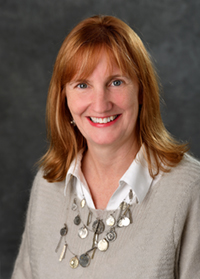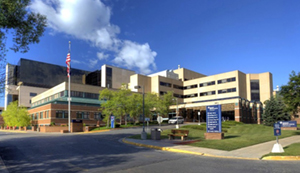Increasing Access to Care for Opioid Use Disorder Patients in Northern Michigan
- Jean Kerver, Ph.D., MSc, RD
- Assistant Professor
- Department of Epidemiology and Biostatistics
- College of Human Medicine
Project Overview
- The Community Opioid Recovery Expansion (CORE) program facilitates long-term recovery and improved health outcomes for people with opioid use disorder (OUD).
- CORE provides rapid and increased access to medication assisted treatment (MAT), through walk-in clinics and counselors, along with complementary behavioral services, such as peer recovery coaching.
Why This Work Matters
- Socio-economic barriers in northern Michigan communities make it difficult for individuals with OUD, especially those who are pregnant or post-partum, to receive treatment.
Products/Outcomes
- Rapid access to MAT services, as well as ongoing, wrap-around behavioral health services
- Annual summative report, providing quantitative data analysis of the accessibility and success of the program
- Infographic reports to enhance community awareness
External Partners
- Terri LaCroix-Kelty, Director of Behavioral Health, Munson Medical Center
- Susan Kramer, Behavioral Health Manager, Munson Medical Center
- Amy Peterson, Grants Administration Officer, Munson Medical Center
- Julia Riddle, Obstetrical Care Physician, Grand Traverse Women's Clinic
MSU Collaborators
- Kelly Hirko, Assistant Professor, Department of Epidemiology and Biostatistics
Form(s) of Engagement
- Community-Engaged Research
- Program evaluations
- Materials to enhance public understanding
- Community-Engaged Service and Practice

Jean Kerver, of MSU's College of Human Medicine, is partnering with Munson Medical Center on the Community Opioid Recovery Expansion (CORE) program.
For individuals struggling to overcome opioid use disorder (OUD), the need for a strong support system is critical. If those individuals are pregnant, that need is critical-times-two. Jean Kerver, assistant professor of epidemiology and biostatistics in the College of Human Medicine (CHM), is working with partners at Munson Medical Center in Traverse City, Michigan, on the Community Opioid Recovery Expansion (CORE) program, an effort that facilitates long-term recovery and improved health outcomes for people with OUD through increased access to medication assisted treatment along with complementary behavioral services.
Kerver was placed at Munson five years ago, as part of CHM's effort to promote public health in rural communities. She was joined in 2016 by MSU colleague Kelly Hirko, assistant professor of epidemiology and biostatistics.
"The College of Human Medicine had this bold initiative to place us in the community and see if we're able to grow in this capacity," said Kerver. "And in fact, I think this grant is a good example that it's working. People know me because I'm co-located there, so when this grant opportunity came up, and the behavioral research team was looking for an evaluator, they asked around and quickly got to me. And with a very short turnaround time, a team of us put this grant together a couple of summers ago."
Funded by the Department of Health and Human Services – Substance Abuse and Mental Health Services Administration (DHHS-SAMHSA), the grant has allowed Munson to increase walk-in access, as well as the number of providers who can write prescriptions for the Medication Assisted Treatment (MAT). "This allows more people to get in-depth, wrap-around services, and most importantly, get access to treatment quickly," said Kerver. "Since the grant has been initiated, Munson has been able to get 100 percent of the people screened and offered an intervention within 48 hours, either with a recovery coach or a Master's license therapist."
Providing Expanded Care
But the grant provides more than fast access to medication. It also provides for expanded access to long-term behavioral health services. One of the complementary services they offer is peer recovery coaching with someone who has had lived experience with addiction and can walk alongside the patient on her recovery journey. "It's so important, because there's such a stigma in our whole society about this, about addiction in general, and opioid use disorder, especially—everywhere you see stigma—so it really helps someone with addiction to have someone on the team who's been there. The grant helps to cover the employment of several peer recovery coaches."

Munson Medical Center in Traverse City, Michigan.
Kerver is working with a team from Munson, which includes Terri LaCroix-Kelty, director of behavioral health, Susan Kramer, behavioral health manager, and Amy Peterson, grants administration officer. Kerver serves as the program evaluator, providing quantitative data analysis for the accessibility and success of the program, which is presented in a summative report to the funding agency each year. But according to Kerver, it's what she does on a daily and weekly basis, meeting with the Munson team to problem-solve implementation issues, that means the most to her.
"It's the process of setting up systems so that we can meet the grant requirements in a timely fashion," explained Kerver. "For example, hiring new people and getting them through the requirements of the hospital, and then training them on the project activities."
Susan Kramer has been at Munson for almost six years, overseeing all the substance use treatment services provided by Munson. These include a residential program, an evening intensive outpatient program, individual and group services, and wellness activities, as well as psychiatry services for both individual and group counseling.
"We have a history of providing substance use disorder treatment—30 plus years—so we've been doing treatment services a long time," said Kramer. "What the CORE program allowed us to do was have our own medication prescriber within our office, so if people with opioid use disorder want access to medications, they can see their prescriber here; they can receive their treatment services here. We added recovery coaching, which is a peer supported service, and we have nursing staff here—so a lot of that care coordination—and all those services happening in one place. Previously, we would just work with people on the treatment side, and if they wanted medication, we would have to work with the provider, and there were no other MAT providers in the area. This has allowed us to have a pretty seamless process."
A Partnership That Reaches Beyond

The CORE program reaches women who are pregnant and struggling with opioid use disorder, providing access to wrap-around services, from medication assisted treatment to counseling and peer recovery coaching.
Because of Munson's 10-county reach, they collaborate with several community service providers. "It's intended to be a collaboration with community partners, as well as the services that are offered at Munson Behavioral Health," said Kerver.
For example, Munson works closely with a nearby women's clinic that offers services to women with OUD who are pregnant or have just recently given birth.
"We have a therapist who sees the referrals from that clinic, and we have meetings with their providers to talk about how those women are doing and needs that they have," said Kramer. "We're just starting to look at co-locations, and we're hoping to do more coaching and case management in other clinics with that population [pregnant and post-partum women], because that was one of our primary populations that we identified in the grant. One of our coaches who is funded by the grant is embedded in our Community Recovery Center that is with a community provider, a nonprofit that also does substance use disorder work. They got a grant to start up a recovery center that offers a walk-in clinic and lots of support and services, but they did not have any coaching at their recovery center. So now we fund a coach through our grant, but she's embedded in that recovery center. We're trying to look at more partnerships and use our resources wisely."
The Need for Care and Compassion
An issue as large and complex as opioid addiction, especially in combination with pregnancy, requires teams of people—coaches and caregivers—to walk through the battle with these women. It also requires compassion and understanding. "I've talked with a lot of people who say, 'Why would they do it? Why would pregnant women take opioids?' It's the sort of stigma I'm talking about," said Kerver. "They do it for all the same reasons that anyone would fall into this, which is complicated and not a quick, one-word answer. And pregnant women are people, just like the rest of us."
Besides the stigma, living in rural, northern Michigan counties presents additional challenges. "Lack of affordable housing and transportation are huge barriers for people to come to therapy and to appointments," said Kramer. "So that's a barrier that leads to cancellations and no shows and missed appointments and phone triage. We have a pretty high percentage of Medicaid population, so social determinants of health are challenges for people, just in terms of focusing on their recovery. They have kids, or their car breaks down. So I think those types of life situations lead to challenges running a clinic."
Kerver explains that the need for consistent, long-term care is urgent, because of issues such as relapse overdose ("overdose" is also called opioid toxicity or poisoning, which is thought to be less stigmatizing). "People sometimes die of opioid poisoning after they've first gone through de-tox and subsequently suffer a relapse. Relapse is a common time for opioid poisoning because your body builds up a tolerance to the dose of medication or drugs that you were taking before you went through de-tox, but then you lose that tolerance when you stop using the drugs. So if you relapse and suddenly go back to that earlier dose with a lower tolerance, accidental overdose is common. Sometimes people can suffer through addiction without using any drugs during their pregnancy, but then they relapse after they have their baby. That is just about the most heartbreaking thing in the world—to have a new mom die of overdose."
The complexity of this issue highlights the need for peer recovery coaches even more. "The peer recovery coaches kind of work as community health workers, too. They're people who have been there," said Kerver. "They know what it feels like to deal with the systems. And they just help people in lots of ways."
Currently, the grant funding is allowing Munson to hire and provide the services of peer recovery coaches, but because the service is sometimes not covered by insurance, the team is working to find ways to get these kinds of services billable, so that the program can be sustainable without the grant.
"The whole thing is trying to expand in a sustainable way—and this is part of the funder's intent," said Kerver. "Part of the reason this will be sustainable is because most of the services provided are reimbursable by insurance including Medicaid. But even though they were, we needed the infrastructure—the grant help for capacity building—and that's what the CORE program has allowed."
Another way the team tries to promote the program's sustainability is by enhancing community awareness through collaboratively produced infographic reports. "I'll help drive those, and those will help inform the community of the value of the program, as well as be beneficial to me from an academic perspective," said Kerver. "And I think working together with the community will help us work on additional needs that come up as this goes. For example, they're working very hard on trying to integrate wellness activities as one of the complementary behavioral sets of activities. I imagine that we could apply for additional grants to explore some of those areas."
Gaining Traction
Getting the CORE program off the ground required a huge up-front effort. "We had a lot of work at the beginning because we had to start from scratch, and we're still figuring out how to do this efficiently," said Kramer. "But we started a year ago [2019] with patients, and I feel really good about the work we're doing. Now there are other providers offering MAT—three places instead of zero. That was not happening a year ago, so there's definitely more access to services for people."
"I really have appreciated Jean's effort," she added. "It's been such a community effort and the right people showed up at the right time. Otherwise, we wouldn't be in as good of a place as where we're in right now."
Kerver shares that passion for working with community to help people. "I feel like our job as academics is to improve people's lives to the extent that we can. That's what we all want to do. Every grant we put in, every paper we write, we want to, in some way, improve life for people. Specifically, with the opioid epidemic, I feel like it's our duty—it's really our charge—to roll up our sleeves and say, 'This is what's happening in the world. How can we help?' I really value the opportunity I have in the community to be able to do that—right there in the world with the people! I love that I'm able to bring the expertise of the university, not just from me, but collaborating with others. And to do it right from within the community and try to address community needs as they arise. It's just very rewarding."
- Written by Amy Byle, University Outreach and Engagement
- Photographs courtesy of MSU University Communications and munsonhealthcare.org